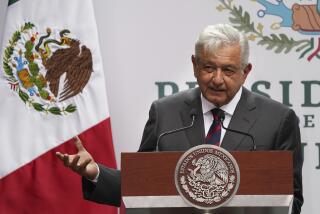Mexico president aims to boost telecom competition
MEXICO CITY — President Enrique Peña Nieto on Monday touted proposed new reforms to boost competition in Mexico’s highly concentrated telecommunications sector — moves that could weaken the influence of billionaire Carlos Slim and television giant Televisa.
The proposed constitutional reforms would create a new, autonomous Federal Telecommunications Institute, which could apply special rules to help small telecom companies compete with big ones, and even force large firms to sell assets if they are deemed too big. The proposal would also make room for new digital TV broadcast networks, and would create a new public broadcasting channel.
“This is one of our biggest initiatives to democratize productivity and create a more dynamic economy,” Peña Nieto said in a speech Monday.
A history of concentrated media ownership and weak regulations in Mexico have resulted in high prices, low infrastructure investment, and some of the lowest cellphone, land-line and broadband subscription rates among the 34 countries in the Organization for Economic Cooperation and Development, according to a study published by the group last year.
The drag on the Mexican economy is estimated at nearly 2% of gross domestic product yearly — or a loss of $129 billion between 2005 and 2009, according to the OECD study.
Slim, 73, and his family are worth roughly $73 billion, making him the world’s richest man, according to Forbes magazine’s annual list of billionaires. His Telcel cellphone company controls 70% of the Mexican market, and his land-line business, Telmex, controls 75% of that market, according to the country’s federal communications commission.
Both are units of the Slim-owned company America Movil.
Left-leaning commentators have often argued that something must be wrong in a country that can produce a Slim while 46% of the population, as of 2010, lived below the poverty line.
America Movil has funded research questioning some of the methodology and findings of the OECD report.
The TV market is dominated by Televisa and the smaller TV Azteca, which together control 94% of Mexico’s commercial frequencies, according to Raul Trejo, a professor and media specialist at the Autonomous University of Mexico.
Tens of thousands of protesters took to the streets to complain about Televisa’s electoral coverage, arguing that it was slanted toward Peña Nieto and his Institutional Revolutionary Party, or PRI.
Given all of the criticism, the network’s coverage eventually became a burden for the president, argued Ramiro Tovar, an economist at the Autonomous Technological Institute of Mexico. Separating himself from Televisa now, Tovar said, will help Peña Nieto foster the perception that he is an independent reformer.
Politically, Tovar said, this is the moment for Peña Nieto to “give the signal that this link could be broken.”
Leaders of the two opposition parties joined Peña Nieto on Monday in singing the reforms’ praises, but Trejo said the reforms could still face resistance in congress.
“It’s a time of great challenges, and also opportunities,” Emilio Azcarraga Jean, the billionaire owner of Televisa, tweeted Monday. “Welcome, competition.”
Sanchez is a news assistant in The Times’ Mexico City bureau.
More to Read
Start your day right
Sign up for Essential California for news, features and recommendations from the L.A. Times and beyond in your inbox six days a week.
You may occasionally receive promotional content from the Los Angeles Times.






